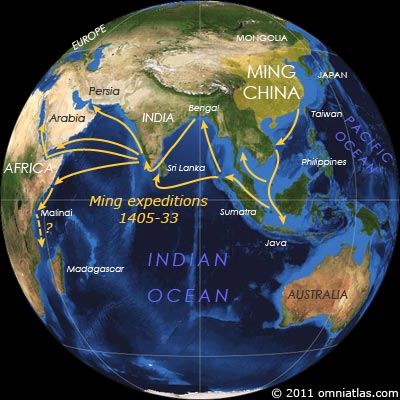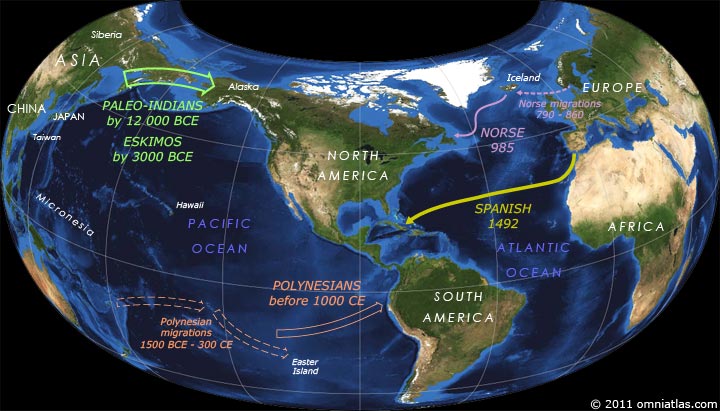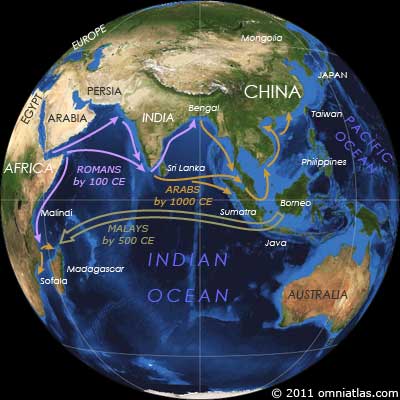
Figure 1. The voyages of Zheng He, 1405-33
From 1405 to 1433, the Chinese Ming dynasty launched seven voyages into the Indian Ocean under the admiralship of the Muslim eunuch Zheng He.
Zheng sailed as far as the east coast of Africa, returning home with such exotic gifts as ostriches and giraffes. With 'Treasure Fleets' of more than three hundred ships crewed by tens of thousands of men, his expeditions were over a hundred times larger than those of Columbus and Magellan.
Centuries later, these voyages would inspire numerous writers to ponder what would have happened had the Chinese headed east and discovered America, while some would even claim that in actual fact they did. More conventional historians have instead focused on why things happened the way they did.
Why the West?
So why did the paltry kingdoms of Western Europe discover the New World with their ragtag flotillas while the vast Chinese Empire and its Treasure Fleets did not?
In Ian Morris' excellent Why The West Rules - For Now: The Patterns of History, and What They Reveal About the Future, he offers one explanation:
Europeans' most obvious geographical advantage was physical: the prevailing winds, the placing of islands, and the sheer size of the Atlantic and Pacific oceans made things easier for them. ...
...[Furthermore] in the fifteenth century economic and political geography conspired to multiply the advantages that physical geography gave western Europe. Eastern social development was much higher than Western, and thanks to men like Marco Polo, Westerners knew it. This gave Westerners economic incentives to get to the East and tap into the richest markets on earth. Easterners, by contrast, had few incentives to go west. They could rely on everyone else to come to them. [2]
In other words, Europeans rather than the Chinese discovered the Americas for two main reasons. Firstly, it was easier for Europeans to cross the Atlantic than for Chinese to cross the Pacific. Secondly, Europeans were motivated by the desire to access China's legendary wealth whereas Chinese had no such incentive for exploration.
However, both these reasons are debatable. Although the Atlantic is narrower than the Pacific, seafarers were exploring the islands of the Pacific millennia before anybody ventured far into the Atlantic. And although "economic incentives" may have played their part, when it comes to exploration Westerners have almost always had a broader view on what constitutes an economic incentive than Easterners. [3]
The discoverers of America
There have been at least five independent discoveries of the Americas - five moments in time when societies previously unaware of the continents stumbled across them. Perhaps twenty thousand years ago, the ancestors of the American Indians arrived from northeast Asia in one or more waves. Arctic hunters such as the Eskimos may have first reached Alaska in a separate migration roughly ten thousand years later.
The next discoverers were probably the Polynesians, who appear to have crossed the Pacific to visit the west coast of South America sometime between 600 and 1000 CE [4]. They may even have been there when, in around 985 CE, the Norse hit the opposite end of the Americas from Greenland and Iceland in the first known crossings of the Atlantic.
Finally, in 1492, Columbus sailed directly across the Atlantic to land in the West Indies, claiming the whole lot for Spain. Within only a few decades, the Americas would be tied firmly into the global economy, their isolation ended forever.

Figure 2. Independent discoveries of the Americas from the first Americans to Colombus
Was the Atlantic easier?
So there we have it - as far as we know, the Americas were discovered first from the Arctic Pacific, then from the tropical Pacific, then the Arctic Atlantic, and finally the tropical Atlantic. That doesn't exactly make the tropical Atlantic approach look the easiest.
Indeed, not only did ancestral American Indians and Eskimos arrive using a Pacific route thousands of years before anyone else, but Polynesians had possibly reached the Americas, and certainly reached Easter Island, before Europeans had even made it to nearby Iceland.
If stone-aged peoples were able to cross the Pacific well before technologically more advanced cultures could make their first moves into the Atlantic, can we really conclude that the Europeans reached the New World before the Chinese because it was easier to cross the Atlantic?
The Advantages of the Pacific
While the Atlantic may be narrower, the Pacific has the advantage of numerous fertile archipelagoes spreading out from Southeast Asia, becoming smaller and sparser as they go. If anywhere on earth offered a perfect set of baby steps for cultures to develop their navigation skills, surely it was here? After all, it was from here that early seafarers spanned out to colonize New Guinea, Australia, Madagascar, New Zealand, and the Pacific islands.
These islands were large and fertile enough to supply and refit European Pacific expeditions in the 18th and 19th centuries, so there seems to be no reason why Chinese explorers couldn't have used them. They were also occupied by tribal peoples, who were usually more amenable than the rival European powers who controlled more and more of the islands of the Atlantic.
The Perfect Ocean

Figure 3. Travelers in the Indian Ocean before Zheng He
However, the easiest ocean to cross was the one that didn't reach the Americas - the Indian. While Zheng He is frequently regarded as China's greatest explorer, the seas over which he traveled were already well-known.
By 2500 BCE, maritime traders had connected Egypt to East Africa and Mesopotamia to India. Greeks, Romans, and Indians would extend this trade network, with merchants sailing directly from Egypt to India by the first century BCE. Roman ambassadors may even have traveled the entire distance by sea when they reached China in 166 CE. [5]
Add Malay migrants and Arab traders into the mix, and, by 1000 CE, shipping routes stretched from Egypt and Sofala to Java and southern China.
Not that this is a criticism of Zheng He - he was on a diplomatic mission to inspire awe in the states of the Indian Ocean, not claiming to discover new lands or explore seas he would have known had been humming with trade for hundreds of years.
Economic Incentives and Exploration
So, while Zheng He might in many respects have been a better man than Columbus or Magellan, he didn't venture into the unknown or discover much that was new. And if Zheng He wasn't a great explorer in that sense, could China have produced one even with more of an incentive?
During the time of the Roman Empire, when, according to Morris, Western social development was higher than Eastern, numerous travelers crisscrossed Eurasia. In this environment, the Chinese would have had plenty of incentives to travel west, yet few if any seem to have.
Roman merchants and envoys reached China, but when Gan Ying was sent as a Chinese envoy to Rome in 97 CE, he made it no further than the Persian Gulf. From the presence of Nestorian Christianity, Judaism, and especially Buddhism in China and the absence of Confucianism and Taoism in the west, it also appears that there were a lot more missionaries traveling to China at this time than from it.
Fast forward over another 1500 years of continually expanding Western knowledge of the world in the face of the economic superiority of the East, and we reach the 18th century. The West and the East have once again, by Morris' measures, reached parity in social development. Yet China's will to explore is possibly even less than before, while Europe is not only just as keen to reach China but is now also exploring the world simply for the sake of science.
Does it matter who discovered America?
But if the Pacific hasn't discouraged exploration and no economic incentive so far encountered in history has made China more inclined to exploration than Europe, why didn't China discover America? Perhaps the best way to answer this is by asking another question: What would China have gained if it had discovered America before Europe? And the answer to that is: Almost nothing because Europe would still have colonized the Americas first.
Why? Because even though the Chinese discovered Taiwan and the Philippines before the Europeans did and had all the advantages of proximity, Europe colonized those places first too. [6] And if China was unable or unwilling to profit from such nearby discoveries, there is little reason to believe it would have behaved differently had it encountered vastly more distant lands.
So China failed to discover America because there was little value in doing so. Had they succeeded, history would probably have turned out pretty much the same, just with an even grander, more expensive period of wasted Chinese exploration. Romantic yes, but regimes don't survive long by squandering their resources to cater for the romantic notions of future historians.
Indeed, when Europeans arrived in the East in the 16th century with evidence of the wealth of the New World, the Chinese made little effort to expel them from their new colonies or even to adopt their military and naval technology [7] - things that the Europeans would certainly have attempted had the situation been reversed. The writing was appearing on the wall, yet still China did not rouse.
However one Eastern empire did act - updating its military, building modern ships, and sending expeditions to European colonies from the Straits of Malacca to Mexico. That country was Japan and what it did next is instructive.
| [1] | translation from: http://www.hist.umn.edu/hist1012/primarysource/source.htm |
| [2] | Morris, Ian. Why The West Rules - For Now: The Patterns of History, and What They Reveal About the Future. New York: Farrar, Straus and Giroux; 2010; p. 427. (http://www.amazon.com/Why-West-Rules---Now-Patterns/dp/0374290024/) |
| [3] | Normally I will speak of Chinese and Europeans on this topic. However, when I talk about Western and Eastern, I use Ian Morris' definitions of those terms. Roughly speaking, a Westerner is someone from Southwest Asia and its cultural descendents, including Europe and its former colonies, while an Easterner is someone from East Asia, with particular emphasis on China and Japan. |
| [4] | It is believed that the Polynesians visited South America because of the presence of a variety of Andean sweet potato in central and eastern Polynesia, including New Zealand. The "kumara", as Polynesians called this vegetable, could not have floated this distance because it rots in seawater. Furthermore, the word "kumara" is strikingly similar to one of its Andean names, "kumala", as spoken in a northern Quechuan dialect near the Gulf of Guayaquil. Additional evidence is that the only location in the Americas to use sails before European contact was the very same Gulf of Guayaquil. Here people used double triangular sailed sailing rafts which shared many features with Polynesian ocean-going canoes. For more, see: The Sweet Potato in Oceania: A Reappraisal. University of Sydney; 2005. (http://www.amazon.com/Sweet-Potato-Oceania-Reappraisal/dp/0945428138/) |
| [5] | Chinese records of the arrival of ambassadors "from Andun, king of Daqin (Rome)" note that the convoy came from the south and therefore probably by sea. The Romans were certainly aware of the existence of a sea route to China as it is described in Ptolemy's Geographia (c.150 CE), along with the Malay Peninsula (Aurea Chersonesus) and almost the entire area covered by Zheng He's voyages. |
| [6] | Chinese merchants were indeed active in the Philippines and Southeast Asia by the 16th century, however they were not accompanied by the extension of state control nor was their presence much of a deterrence to European conquest. If China had discovered the Americas and similar merchants had decided to move to, for example, Aztec Mexico and had been successful, it seems unlikely that they would have had a significant impact on world history. |
| [7] | China did value Western astronomical knowledge and timepieces and later on, in the 17th century, a Chinese faction would expel the Dutch from Taiwan. However, these are all minor achievements when compared with either the Japanese adoptions from the West or with Western expansion in the same period. |